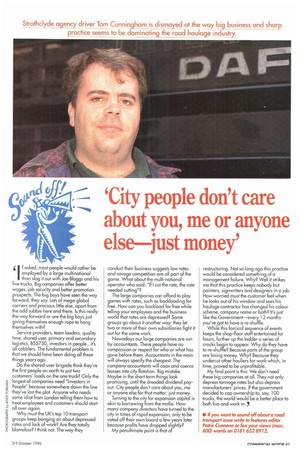'City people don't care about you, me or anyone else—just money'
Page 45

If you've noticed an error in this article please click here to report it so we can fix it.
t f asked, most people would rather be I employed by a large multinational than slog it out with Joe Bloggs and his five trucks. Big companies offer better wages, job security and better promotion prospects. The big boys have seen the way forward, they say. Lots of mega-global carriers and precious little else, apart from the odd subbie here and there. Is this really the way forward or are the big boys just giving themselves enough rope to hang themselves with?
Service providers, team leaders, quality time, shared user, primary and secondary logistics, BS5750, investors in people.. .it's alfcobblers. The fundamental problem is that we should have been doing all these things years ago. Do the shared-user brigade think they're the first people on earth to put two customers' loads on the one truck? Only the largest of companies need "Investors in People" because somewhere down the line they've lost the plot. Anyone who needs some idiot from London telling them how to treat employees and customers should start all over again.
Why must the UK's top 10 transport groups keep banging on about depressed rates and lack of work? Are they totally blameless? I think not. The way they conduct their business suggests low rates and savage competition are all part of the game. What about the multi national operator who said: "If I cut the rate, the rate needed cutting"? The large companies can afford to play games with rates, such as backloading for free. How can you backload for free while telling your employees and the business world that rates are depressed? Some groups go about it another way: they let two or more of their own subsidiaries fight it out for the same work.
Nowadays our large companies are run by accountants. These people have no compassion or respect for who or what has gone before them. Accountants in the main will always specify the cheapest. The company accountants will coax and coerce bosses into city flotation. Big mistake. Maybe in the short term things look promising, until the dreaded dividend payout. City people don't care about you, me or anyone else for that matter; just money. Turning to the city for expansion capital is akin to borrowing from the mafia. How many company directors have turned to the city in times of rapid expansion, only to be voted off their own board a few years later because profits have dropped slightly? My penultimate point is that of restructuring. Not so long ago this practice would be considered something of a management failure. Why? Well it strikes me that this practice keeps nobody but painters, signwriters and designers in a job. How worried must the customer feel when he looks out of his window and sees his haulage contractor has changed his colour scheme, company name or both? It's just like the Government—every 12 months you've got to have a re-shuffle. While this farcical sequence of events keeps the shop-floor staff entertained for hours, further up the ladder a series of cracks begin to appear. Why do they have to re-shuffle? Because parts of the group are losing money. Why? Because they undercut other hauliers for work which, in time, proved to be unprofitable. My final point is this: We don't need these big companies at all. They not only depress tonnage rates but also depress manufacturers' prices. If the government decided to cap ownership to, say, 100 trucks, the world would be a better place to both live and work in.








































































































